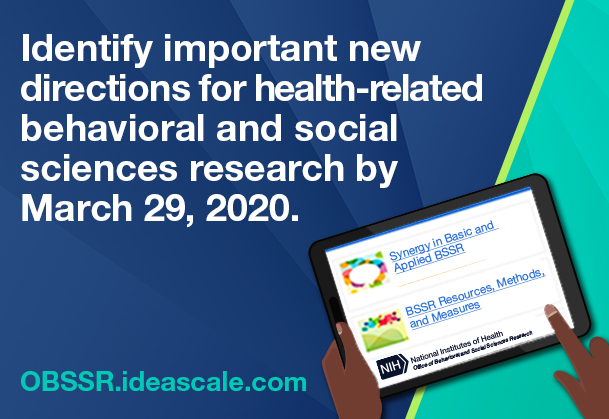Identify Important New Directions For Health-Related Behavioral and Social Science Research
Submit comments to the NIH Office of Behavioral and Social Sciences Research by March 29

The NIH Office of Behavioral and Social Sciences Research (OBSSR) is seeking broad public input on important new directions for health-related behavioral and social sciences research (BSSR). Specifically, OBSSR requests your input on research directions that will support the achievement of the scientific priorities in the OBSSR Strategic Plan 2022-2026 (see current strategic plan) and that will advance or transform the broader health impact of BSSR. OBSSR is interested in focusing on research directions that are trans-disease and cross-cutting in nature and address critical gaps in the field.
The role of OBSSR is to coordinate and promote BSSR research across the NIH and assist NIH Institutes and Centers in developing research and training resources to advance the field. OBSSR supports a broad range of BSSR disease, condition, population, and setting specific priorities across the NIH covering the spectrum from basic to implementation science research.
OBSSR would like input on the most important or cutting-edge, trans-disease research directions that would accelerate progress in these three strategic priority areas:
- Synergy in Basic and Applied BSSR
OBSSR is committed
to advancing cross-cutting approaches that stimulate health-related research on
the fundamental processes that influence behavior and social systems. This
includes facilitating the translation of basic BSSR findings into pathways to
improve individual and population health and using intervention or
population-based research findings to inform meaningful new fundamental
research questions.
Ideas could include emerging basic BSSR areas that are promising for
application to human health; basic BSSR findings that are ready for translation
to promote health behavior change; or study of novel processes or mechanisms
that influence behavior and social systems that would enhance the impact,
reach, or durability of behavioral interventions.
- BSSR Resources, Methods, and Measures
The future of an efficient and integrated approach to BSSR requires the development and application of innovative research resources, measures, and methods.
Ideas could include new research resources, tools or infrastructure that are needed to accelerate BSSR; promising new methods and measures that should be used more widely in BSSR; or research domains or constructs that require improved measurement to advance BSSR.
- Adoption of Effective BSSR in Practice
There is often there is a significant time lapse between the publication of research findings that demonstrate the efficacy of a prevention or healthcare strategy and when these approaches are adopted in practice and delivered to individuals, families, communities, and organizations. Research is needed to facilitate more rapid, effective, and widespread uptake and sustained implementation of BSSR findings to improve healthcare and public health.
Ideas could include methods to develop and test interventions that are designed with eventual dissemination and implementation factors in mind; research that is needed to accelerate the implementation of effective interventions; or approaches to encourage more rigorous evaluation of interventions, programs, or policies that are already being implemented.
To ensure
consideration, responses must be
submitted by midnight (EST) March 29, 2020 through OBSSR’s crowdsourcing
IdeaScale website. Once your IdeaScale account is created and you
are logged in, you can submit an idea, browse and respond to comments that have
already been submitted, and vote for your favorite ideas.
If you have an inquiry, please contact Farheen Akbar at Farheen.akbar@nih.gov
or 301-496-9165.
____________________________
Follow OBSSR on Facebook, Twitter and YouTube, and subscribe to receive email updates.





APS regularly opens certain online articles for discussion on our website. Effective February 2021, you must be a logged-in APS member to post comments. By posting a comment, you agree to our Community Guidelines and the display of your profile information, including your name and affiliation. Any opinions, findings, conclusions, or recommendations present in article comments are those of the writers and do not necessarily reflect the views of APS or the article’s author. For more information, please see our Community Guidelines.
Please login with your APS account to comment.